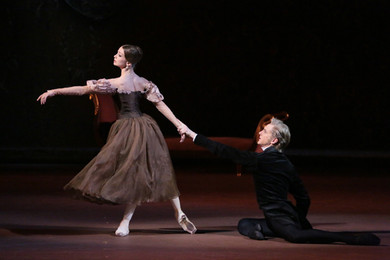Main Stage
Running time: 2 hours 35 minutes Choreography by John Cranko John Cranko first had the idea for a ballet based on Alexander Pushkin‘s verse novel when he choreographed dances for Tchaikovky’s opera Eugene Onegin in 1952. He pitched this to the ROH board at Covent Garden but it was rejected. After a string of successful pieces for Sadler’s Wells Ballet (Pineapple Poll 1951, The Lady and the Fool 1956 and The Prince of Pagodas, 1957), Cranko left London for Stuttgart. There he created one of the most successful ballet adaptations of Romeo & Juliet (1962) and confirmed his flair for dramatic narrative, in the same vein as his contemporary and close friend Kenneth MacMillan (whose own choreographic language would be influenced by Cranko’s). In Stuttgart he received full support from Walter Erich Schafer – General Manager of the opera and dance companies – to revisit his Onegin project, with the caveat that the opera score should not be used. Instead it fell to Kurt-Heinze Stolze, ballet Kapellmeister, to assemble various little known Tchaikovsky pieces into a ballet score. Cranko developed a libretto closely following the novel and the ballet premiered 13 April 1965 with Marcia Haydee as Tatiana and Ray Barra as Onegin. Forty five years on, Onegin is considered Cranko’s definitive masterpiece and remains in the repertory of over 20 ballet companies around the world. At the time of its premiere Onegin was hailed a success with audiences and performers, but there was some controversy with opera purists and other personalities (for instance George Balanchine) who did not approve of the opera score having been discarded. Act I Scene 1: Madame Larina’s Garden, Russia early Nineteenth century Madame Larina, her youngest daughter Olga and the nurse Filipevna are seen gossiping and embellishing party dresses, while Tatiana, Larina’s eldest daughter, does not seem at all interested in what she will wear at her own upcoming birthday party. She prefers to keep reading her book. As young girls from the nearby estates arrive, Olga and Tatiana invite them to play a game with a mirror. They believe if a girl looks into the mirror at a specific time, she will see the image of her future husband reflected. Lensky, a young poet betrothed to Olga, arrives with Onegin, his friend from St. Petersburg who has come has come in search of countryside distractions. While introductions are still being made, Tatiana looks into the mirror and sees Onegin’s face. This fuels her romantic fantasies. They meet and Onegin invites her to take a stroll, while Lensky and Olga are left alone to declare their love for each other. Onegin starts losing interest after finding her universe very provincial; he sees in Tatiana a naive country girl who reads too many love stories. Tatiana on the other hand is completely infatuated with this elegant and sophisticated stranger who is so different from the countrymen she knows. Scene 2: Tatiana’s Bedroom Alone in her bedroom Tatiana fantasises about her encounter with Onegin and decides to write a love letter, opening her feelings to him. She falls asleep and dreams of him. In dreams her earlier premonition comes alive; here Tatiana and Onegin dance the famous “mirror Pas de Deux“ Act II Scene 1: Madame Larina’s House Guests arrive to celebrate Tatiana’s birthday. The room is full of gossip, not only about Olga’s engagement to Lensky, but also about a blossoming romance between Tatiana and the newcomer. Among the guests is Prince Gremin, a distant relative. He is in love with Tatiana and Madame Larina hopes for a match, but Tatiana barely notices him. Onegin finds the event tedious and struggles to maintain civility; he is irritated with Tatiana’s letter which he regards as a product of adolescent infatuation. He seeks out Tatiana. Telling her he cannot possibly love her he tears up the letter. Instead of feeling sympathy towards Tatiana’s obvious distress, he leaves irritated. For his own amusement Onegin decides to provoke Lensky and flirts openly with Olga. She responds jokingly to his attentions but Lensky takes offence. In a fit of jealousy he challenges Onegin for a duel. Scene 2: The Duel Lensky stands alone, meditating on the incident. He dances a solo, where he expresses his sadness. Tatiana and Olga arrive to try and reason with him, but his high romantic ideals have been destroyed. He is devastated and regards Onegin’s foolish behaviour as a betrayal. Onegin arrives and attempts a reconciliation but Lensky is adamant. The duel takes place and Lensky ends up being shot. For the first time in his life, Onegin is aghast at the events and with deep remorse, he leaves. Act III Scene 1: Prince Gremin’s Palace in St. Petersburg Many years have passed and Onegin has just returned to St. Petersburg from his travels around the world. He is received at a ball in Prince Gremin’s palace. Gremin has recently married and Onegin is shocked to discover that his elegant young wife is none other than Tatiana who now looks grown up and transformed. There and then he realises his mistake and how his life has been wasted. He decides to seek out Tatiana to confess his love for her. Scene 2: Tatiana’s Room. Tatiana reads a love letter from Onegin. He is standing before her, awaiting her answer. For a moment Tatiana reminisces about the past and her fantasies but, regaining composure, she tells him that it’s too late; she used to love him but now she must remain faithful to her husband. Onegin insists and in despair, she tears up the letter and commands him to leave. He obeys at last. Alone again, Tatiana collapses with grief.
© Photo by Damir Yusupov/Bolshoi Theatre. www.theballetbag.com | ||||||||||


